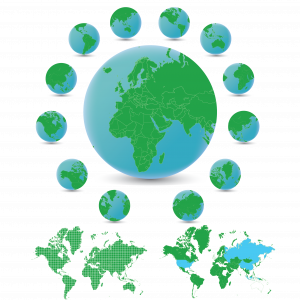
International social work careers can take you all over the world, but these roles are also are some of the most complex in social work.
Social work has always been a way to improve people’s quality of life and well-being. But what if that community takes you far away from home? International social workers focus and move worldwide to protect against social injustices, violations of civil liberties, human rights violations, crisis intervention, and problems from poverty.
This field is also one of the most complex International Social Work combines several disciplines such as sociology, law, medicine, philosophy, anthropology, psychology, politics, and also economics. When you work as an international social worker, you face even more issues going to different parts of the world and working within several cultures. That’s why resourcefulness, humility, communication, and tenacity are essential qualities to anyone who wants to work in international social work. This guide goes over the basics of international social work, how to get a job in this field, and overcoming some of the challenges that these humanitarians face.
What is International Social Work?
Social work is a very broad term. Domestic social work will often take you down several avenues, whether working with children, the homeless, adults, families or handicapped. However, the goal is still the same. Social workers want to improve the quality of life for individuals, communities, groups, minorities, or the impoverished. The difference is in the way that you go about it.
For instance, you can’t replace a way of doing something as better. Instead, it must be equal, and you must contribute as a gentle mentor and innovator. International social workers work on what they learn from domestic social work and combine it with foreign studies and language to offer their services abroad. While language is a significant part of working internationally, social workers have to learn a lot about the culture and understand the complex issues that people face every day.

Types of Jobs for an International Social Worker
International social work careers are available in many sectors and locations.
- educational programs
- community organizing
- international organizations
- international relations
- global health
- social justice
- foreign language
- gender equity
- child protection
- human services
- international setting
- foreign countries
- mental health
- intercultural communication
- domestic setting
- region specific education
- child labor
What Education Do You Need to be an International Social Worker?
Students interested in pursuing a career in international social work can achieve this goal with education. Some accredited international social work programs at the graduate level have a global concentration. These international social work master’s degree programs prepare students with the skills to work in the field. In addition, within these educational programs students can find more information about schools in other countries from the International Association of Schools of Social Work (IASSW).
What are the Attributes and Qualities of an International Social Worker?
Most international social workers have to do extensive research about where they want to work. They are resourceful people with a knack for understanding people of different cultures and beliefs. It ultimately takes a lot of humility and determination, especially when coming into a community that may not appreciate your presence.
Being personable, generous, and genuinely willing to learn are vital skills needed to connect with people. Most international social workers start as domestic social workers. Typically, someone may for five years in a community and then branch out into international social work. These people also have lived with different cultures and classes. Community organization, fundraising, and grant writing are also fundamental skills to helping grassroots organizations in other countries.

Job Environment for an International Social Worker
The market for international social work jobs is very competitive. When you work on a global scale, you compete with people from all over the globe for one position. With more job competition, you must understand the necessary experience, skills, resources, and cultures involved in a post before applying. Prospective employers hire the best person for the job. Therefore, they assess an applicant’s previous experience, cultural knowledge, and also innovative projects.
When you work as a social worker, you must be prepared to handle anything. You may live in another class or spend time living with villagers in a remote part of the world. That’s why it is so essential to be humble and resourceful because as much as a community needs you, you also need them. You’ll need plenty of skills to become an international social worker. You never know where you may have to travel or what to do to help a community.
Many international social workers start as volunteers. This starting point gives you more of a chance to learn skills and gain cultural experience for a more significant, paid role in the future. Currently, paid international humanitarian positions are limited because unemployment is very high in other countries. That’s why volunteers can get their foot in the door and also gain worldly experience for multiple causes.

What Organizations Employ International Social Workers?
There are a variety of international organizations for social work jobs. Some of these are government-related, and others are private grassroots organizations. In addition, people often earn positions through national embassies, which are in capital cities. These embassies should have a list of programs and organizations in their country that work with different communities.
The list of international social work organizations is long, but a few organizations are popular with international social workers. These include:
- International Rescue Committee (IRC)
- International Justice Mission (IJM)
- Council for International Education and Exchange (CIEE)
- Institute for International Education (IIE)
- International Society for the Intercultural Training and Research
These international organizations also have a lot of resources for those who want to get into international social work. They list all of their openings online at the UN Careers network. In addition, a variety of colleges and other institutions have programs that get you started in international social work quite early. Finally, professors with international backgrounds or study abroad advisers can provide more literature on how to join a program to go overseas as a global social worker
Your Career In International Social Work
International social work is definitely for those inspired by other cultures. However, the road to becoming a successful international humanitarian takes a lot of time working within other cultures and getting used to the feeling of being out of place but not out of touch. While many jobs will test your experience and knowledge, if you have a passion for helping communities get organized and provide resources, you will be a great asset no matter where you go.
Anyone considering a professional career as an international social worker must research and consider all factors before choosing to leave their home. In addition, it’s often a culture shock to enter a different world. However, by volunteering and working with grassroots organizations worldwide, you’ll gain more comfort and the ability to prepare yourself for much more significant roles down the road.
How Much Do International Social Workers Get Paid?
According to the United States Bureau of Labor Statistics, the need for international social workers is growing and is expected to continue to grow by 13 percent over the next decade. The base salaries for international social workers range between $37,000 per year to $80,000 per year. This means the average salary for an international social worker is around $50,000 per year.
The amount of money an international social worker will make on an annual basis will depend on the organization they work for and the location in which they will be working. For example, if an international social worker obtains a job position with a small organization, they can expect to get closer to the $37,000 per year range. International social workers that work for large organizations such as NGO Abroad can make a higher annual income.
Is There a Need for More Social Workers?
There is currently a higher need than ever before for international social workers. This is due to the fact that the population around the world is aging. People are struggling throughout the world to help the elderly secure the resources they need. International social workers can help fill this gap for people who are still living in very oppressed countries. International social workers are also needed to assist asylum seekers and refugees in a variety of different countries around the globe that are in the process of fleeing their home countries. People leave their home countries for a variety of reasons, including severe poverty in war-torn areas.
While social workers who hold a bachelor’s degree in social work have many opportunities to work internationally, the opportunities increase for those with a master’s degree in social work. This is due to the fact that social workers with a master’s degree are fully licensed and can hold leadership positions or therapist positions in areas where they are needed.
Where are International Social Workers Needed?
International social workers are in high demand all over the world. Most social workers ought to work for specific agencies that can place them in areas where they are most needed.
United Nations
Established in 1945, the United Nations is made up of 193 countries. International social workers are needed to assist in areas that are experiencing political upheavals or are in need of humanitarian relief. They are also needed in countries in which people need to receive emergency relief or create sustainable development. International social workers can also be sent on peacekeeping missions where they can help people secure the resources they need to achieve their goals.
International Labor Organization (ILO)
This organization is focused on promoting work and labor opportunities and rights and standards for workers. This includes men, women, and children. This organization places social workers in 187 different areas of the world to give a voice to workers by helping governments and employers create policies and programs that help the workers.
World Health Organization (WHO):
The WHO is completely dedicated to global safety and health and works with 194 different countries. Social workers are needed to help with sustainable development, types of peace building, and also climate and disaster relief.
Save the Children
This international organization works with 120 different countries to help improve and even save the lives of children. Social workers can help ensure that children receive the health care they need as well as proper nutrition, education, housing, and protection services.
Related:

